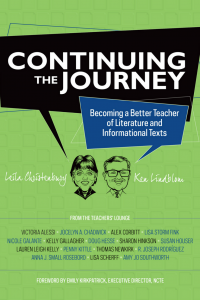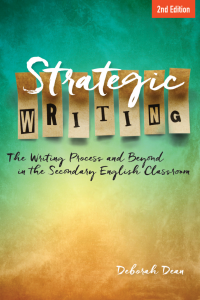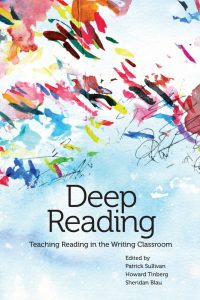Asking an English teacher to pick a favorite book is almost impossible! But that’s exactly what we did during our January #NCTEchat, New Year/New Ideas. During the chat, we asked educators to share one text (poem, book, novel) that they would recommend every teacher (or student) read in 2018. As you might expect, we received HUNDREDS of wonderful recommendations!
Get ready to add a lot of books to your To Be Read pile, because over the next few weeks we’ll be sharing all of the recommendations we received. We’ll kick off the series this week with educators’ favorite professional development books.
If we missed one of your favorites, be sure to let us know on Twitter! All recommendations were pulled from January’s #NCTEchat archive, which you can find here.
Book descriptions are taken from the Goodreads website.

Grit: The Power of Passion and Perseverance by Angela Duckworth
Why do some people succeed and others fail? Sharing new insights from her landmark research on grit, Angela Duckworth explains why talent is hardly a guarantor of success. Rather, other factors can be even more crucial, such as identifying our passions and following through on our commitments.
Why you should read this book: We need to start developing the character of our students if we want them to achieve greatness. We need to help develop intrinsic motivation for our students. That starts with helping them discover their “why.”
Disrupting Thinking: Why How We Read Matters by Kylene Beers and Robert E. Probst
Beers and Probst discuss an ongoing problem: lack of engagement with reading. The problem, they suggest, is that we have misrepresented to students why we read and how we ought to approach any text—fiction or nonfiction.
Enticing Hard-to-Reach Writers by Ruth Ayers
Enticing Hard-to-Reach Writers invites you on a journey to become a teacher who refuses to give up on any student, who helps children believe that they can have a positive impact on the world, and who—in some cases—becomes the last hope for a child to heal.
A More Beautiful Question: The Power of Inquiry to Spark Breakthrough Ideas by Warren Berger
A More Beautiful Question outlines a practical Why / What If / How system of inquiry that can guide you through the process of innovative questioning—helping you find imaginative, powerful answers to your own “beautiful questions.”
Why you should read this book: Great art, books included, promote questions not only answers. This book helps think about the importance of questions.
Pose, Wobble, Flow: A Culturally Proactive Approach to Literacy Instruction by Antero Garcia and Cindy O’Donnell-Allen
This book proposes a pedagogical model called Pose, Wobble, Flow to encapsulate the challenge of teaching and the process of growing as an educator who questions existing inequities in schooling and society and frames teaching around a commitment to changing them.

How Children Succeed: Grit, Curiosity, and the Hidden Power of Character by Paul Tough
Drawing on groundbreaking research in neuroscience, economics, and psychology, Tough shows that the qualities that matter most have less to do with IQ and more to do with character: skills like grit, curiosity, conscientiousness, and optimism.
Notice and Note: Strategies for Close Reading by Kylene Beers and Robert E. Probst
Beers and Probst offer insights into how to create text-dependent questioning in assisting students to develop greater reading comprehension skills.
Embarrassment: And the Emotional Underlife of Learning by Thomas Newkirk
In this groundbreaking exploration, Newkirk offers practices and strategies that help kids and teachers alike develop a more resilient approach to embarrassment.
Why you should read this book: It helps teachers and students to move outside their comfort zones.
Building Powerful Learning Environments: From Schools to Communities by Arina Bokas
A learning environment has traditionally been viewed as something that educators created and sustained inside their schools. Building Powerful Learning Environments expands this understanding to embrace families, communities, other learning institutions, and businesses not as helpers, but as co-builders of a powerful learning environment.
Culturize: Every Student. Every Day. Whatever It Takes. by Jimmy Casas
In Culturize, Jimmy Casas shares insights into what it takes to cultivate a community of learners who embody the innately human traits our world desperately needs, such as kindness, honesty, and compassion.

Change Over Time in Children’s Development by Marie M. Clay
How do children’s simple literacy responses become controlled, accurate, and coordinated? Clay answers with a rich and readable account of literacy learning drawn from research and theory in developmental psychology, neuropsychology, information-processing theory, and linguistics.
Literacy Essentials: Engagement, Excellence, and Equity for ALL Learners by Regie Routman
Based on her ongoing teaching, leading, and coaching in diverse schools and districts, Routman offers K–12 teachers and leaders practical, easy-to-implement tools to help students develop as self-determining readers, writers, and learners.
Helping Children Succeed: What Works and Why by Paul Tough
Mining the latest research in psychology and neuroscience, Tough provides us with insights and strategies for a new approach to childhood adversity, one designed to help many more children succeed.
Shifting the Monkey: The Art of Protecting Good People from Liars, Criers, and Other Slackers by Todd Whitaker
Poor employees get a disproportionate amount of attention. Why? Because they complain the loudest, create the greatest disruptions, and rely on others to assume the responsibilities that they shirk. Learn how to focus on your good employees first and help them shift these “monkeys” back to the underperformers.
Teach Like a Pirate: Increase Student Engagement, Boost Your Creativity, and Transform Your Life as an Educator by Dave Burgess
Based on Dave Burgess’s popular “Outrageous Teaching” and “Teach Like a PIRATE” seminars, this book offers inspiration, practical techniques, and innovative ideas.

World Class Learners: Educating Creative and Entrepreneurial Students by Yong Zhao
Researcher and professor Yong Zhao unlocks the secrets to cultivating independent thinkers who are willing and able to create jobs and contribute positively to the globalized society.
Teach Like Finland: 33 Simple Strategies for Joyful Classrooms by Timothy D. Walker
From incorporating brain breaks to offering a peaceful learning environment, this book pulls back the curtain on the joyful teaching practices of the world’s most lauded school system.
The Innovator’s Mindset: Empower Learning, Unleash Talent, and Lead a Culture of Creativity by George Couros
George Couros encourages teachers and administrators to empower their learners to wonder, to explore—and to become forward-thinking leaders.
For White Folks Who Teach in the Hood . . . and the Rest of Y’all Too: Reality Pedagogy and Urban Education by Christopher Emdin
With this fresh and engaging new pedagogical vision, Emdin demonstrates the importance of creating a family structure and building communities within the classroom, using culturally relevant strategies like hip-hop music and call-and-response, and connecting the experiences of urban youth to indigenous populations globally.
The Wild Card: 7 Steps to an Educator’s Creative Breakthrough by Wade and Hope King
In this book, Wade and Hope King show you how to draw on your authentic self–your past experiences, personality quirks, interests, hobbies, and strengths–to deliver your content creatively.

Readicide: How Schools Are Killing Reading and What You Can Do About It by Kelly Gallagher
Reading is dying in our schools. Educators are familiar with many of the factors that have contributed to the decline—poverty, second-language issues, and the ever-expanding choices of electronic entertainment. In this provocative new book, Kelly Gallagher suggests, however, that it is time to recognize a new and significant contributor to the death of reading: our schools.
The Book Whisperer: Awakening the Inner Reader in Every Child by Donalyn Miller
Miller dispenses with the more traditional reading instruction of book reports and comprehension worksheets in favor of embracing students’ choices in books and independent reading.
Book Love: Developing Depth, Stamina, and Passion in Adolescent Readers by Penny Kittle
In Book Love Kittle takes student apathy head on, first by recognizing why students don’t read and then showing us that when we give kids books that are right for them, along with time to read and regular response to their thinking, we can create a pathway to satisfying reading that leads to more challenging literature and ultimately, a love of reading.
Reading Ladders: Leading Students from Where They Are to Where We’d Like Them to Be by Teri Lesesne
With reading ladders, you start with the authors, genres, or subjects your readers like and then connect them to book after book—each a little more complex or challenging than the last.
Teaching to Transgress: Education as the Practice of Freedom by bell hooks
bell hooks–writer, teacher, and insurgent black intellectual–writes about a new kind of education, education as the practice of freedom. Teaching students to “transgress” against racial, sexual, and class boundaries in order to achieve the gift of freedom is, for hooks, the teacher’s most important goal.
Looking for even more books to add to your collection?
Be sure to check out NCTE’s store for hundreds of books and journals that can help you develop your teacher toolkit! Some recent favorites have included:
 Continuing the Journey: Becoming a Better Teacher of Literature and Informational Texts by Leila Christenbury and Ken Lindblom
Continuing the Journey: Becoming a Better Teacher of Literature and Informational Texts by Leila Christenbury and Ken Lindblom
In Continuing the Journey, Leila Christenbury and Ken Lindblom are joined by almost two dozen classroom teachers and researchers to offer practical advice, encouragement, and cutting-edge ideas that you can implement in your classroom, with a focus on literature and informational texts.
 Strategic Writing: The Writing Process and Beyond in the Secondary English Classroom, 2nd edition by Deborah Dean
Strategic Writing: The Writing Process and Beyond in the Secondary English Classroom, 2nd edition by Deborah Dean
For this revised edition, Dean worked with high school teachers to refine, reorganize, and update the material to better support classroom teachers dedicated to teaching not just the process of writing but also the strategies that help students learn to write effectively throughout their lives.
 Deep Reading: Teaching Reading in the Writing Classroom, edited by Patrick Sullivan, Howard Tinberg, and Sheridan Blau
Deep Reading: Teaching Reading in the Writing Classroom, edited by Patrick Sullivan, Howard Tinberg, and Sheridan Blau
Contributors to this collection argue that college-level reading must be theorized as foundationally linked to any understanding of college-level writing.

